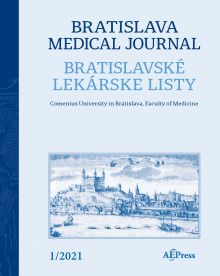Journal info
|
||||
Select Journal
Journals
Bratislava Medical Journal 2024 2023 2022 2021 2020 2019 2018 2017 2016 2015 2014 2013 2012 Ekologia - Ecology Endocrine Regulations General Physiology and Biophysics Neoplasma Acta Virologica Studia Psychologica Cardiology Letters Psychológia a patopsych. dieťaťa Kovove Materialy-Metallic Materials Slovenská hudba 2025Webshop Cart
Your Cart is currently empty.
Info: Your browser does not accept cookies. To put products into your cart and purchase them you need to enable cookies.
Bratislava Medical Journal Vol.123, No.5, p.315–321, 2022 |
||
| Title: How COVID-19 crisis influenced kidney transplant recipients in Slovakia | ||
| Author: Zuzana ZILINSKA, Martin CHRASTINA, Marcela ZITNAKOVA, Eva LACKOVA, Marcel CELLAR, Luboslav BENA, Tatiana BALTESOVA, Jaroslav ROSENBERGER, Karol GRANAK, Matej VNUCAK, Ivana DEDINSKA, Jan BREZA | ||
| Abstract: OBJECTIVES: The aim of our analysis was to evaluate the impact of the COVID-19 pandemic on the procurement program and kidney transplantation in Slovakia and to identify the risk factors for a severe course of COVID-19 disease, as well as the risk factors for COVID-19 fatalities, with the focus on the parameters preceding the infection. We compared morbidity and mortality from COVID-19 before and after the spread of the alpha variant of the virus and the same among transplant (KTRs) and haemodialysis patients in Slovakia. METHODS: 305 KTRs (68.8 % males) with confirmed SARS-CoV-2 positivity were included in the multicentric retrospective analysis. The patients were split into subgroups based on the time of falling ill and their clinical course. RESULTS: The procurement program and kidney transplants in Slovakia dropped in the observed period by 28.6 % (p<0.0001) and by 33.5 % (p<0.0001) respectively. Age over 59 years (p=0.0088) and diabetes mellitus (p=0.0106) were identified as independent risk factors for severe course of the disease. Risk factors for death were the age over 59 years (p=0.0003) and graft dysfunction with CKD-EPI<0.5 mL/s (p=0.0029). The prevalence of the alpha variant in Slovakia was associated with a severe course in KTRs treated with corticoids (p=0.0273) and in graft dysfunction with CKD-EPI<0.5 mL/s (p=0.0076); the risk of death was higher in KTRs over 59 years (p=0.0173) and again with CKD-EPI<0.5 mL/s (p=0.0393). KTRs had a 3.7 times lower risk of infection compared to the haemodialysis patients (p<0.0001), with mortality of 9.8 % vs 30 % (p<0.0001). CONCLUSION: The procurement and transplant program is sustainable even during a pandemic, provided that measures are set up quickly. Morbidity and mortality from COVID-19 in KTRs was comparable to the situation in EU countries. Patients in the haemodialysis program had a worse prognosis (Tab. 5, Fig. 1, Ref. 21) |
||
| Keywords: COVID-19, kidney transplantation, dialysis, immunosuppression, obesity, diabetes mellitus | ||
| Published online: 14-Apr-2022 | ||
| Year: 2022, Volume: 123, Issue: 5 | Page From: 315, Page To: 321 | |
| doi:10.4149/BLL_2022_049 |
||
|
|
 download file download file |
|

